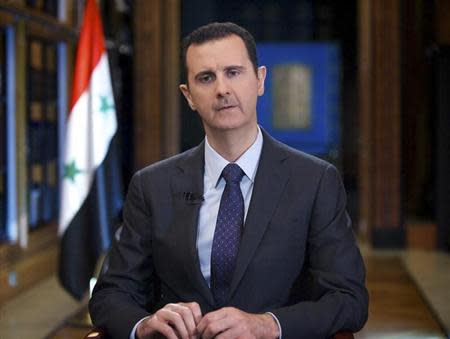Syria tells Western foes to stop dreaming Assad will go

By Dominic Evans BEIRUT (Reuters) - Western countries which demand that President Bashar al-Assad step down should either stop dreaming or forget attending peace talks in January, Syria said on Wednesday. Responding to an announcement that the long-delayed "Geneva 2" conference aimed at resolving Syria's civil war will be held on January 22, it said Assad's government would take part in the meeting but reiterated that it had no plans to surrender power. The statement highlighted the seemingly unbridgeable gulf between opposing sides in the 2-1/2 year conflict, which has killed more than 100,000 people, caused tens of billions of dollars in damage, and driven millions from their homes. The head of the Western-backed Free Syrian Army rebel brigades has rejected the Geneva talks and says there will be no ceasefire during the meeting. Powerful Islamist fighters have gone further, threatening to put on trial anyone who attends talks which do not deliver Assad's ouster. The National Coalition opposition group, which also has Western support but minimal influence over fighters on the ground, says it will decide next month whether to go to Geneva. It has previously said it is ready to attend if humanitarian aid corridors are set up and political prisoners released, and insists Assad can play no future role in Syria. Assad, however, has consolidated his power around Damascus and central Syria after months of steady military gains. With support from Iran and Russia and backed by fighters from Lebanon and Iraq, his soldiers recaptured towns this month on the edge of the capital and the southern approaches to Aleppo. More secure than a year ago from the mainly Sunni rebels, whose ranks are also swelled from abroad by an influx of Islamist jihadi fighters, he faces little internal pressure to make concessions to his foes. "The age of colonialism, with the installation and toppling of governments, is over. They must wake from their dreams," a foreign ministry source said on Wednesday in response to French and British calls for Assad to step aside. "If they insist on these delusions, there is no need for them to attend Geneva 2," said the source in a statement carried by the official SANA news agency. "Our people will not allow anyone to steal their right to choose their future and their leadership," the source said. "The official Syrian delegation is not going to Geneva to surrender power." Underlining the continued emphasis which both sides place on a military solution to the conflict, the statement also said that "eliminating terrorism" - a phrase used by authorities to describe their battle with the rebels - would be the top issue for the government delegation in Geneva. CEASEFIRE CALL The foreign ministers of Turkey and Iran called on Wednesday for a ceasefire in Syria before the January 22 talks. Russia, which with the United States and international mediator Lakhdar Brahimi is helping convene the conference, said no side could set preconditions for it, and that calls for Assad's departure aimed to scuttle the meeting. Foreign Minister Sergei Lavrov said "there will never be ideal conditions" for the talks. "All those who say it's necessary to wait for a military balance to be achieved on the ground, or for all external aid from all sides to be stopped, or for a date for President Assad's exit from his post...this is all done, in my opinion with the unseemly aim of creating difficulties for the conference or causing it to fail entirely," he said. The fractured opposition should be represented by a single delegation, he said. Russia has been seeking to bring an array of opposition leaders to Moscow for talks before the conference. The effort has borne no fruit so far, but Lavrov said that all opposition groups Russia had spoken with had expressed interest, and that a date was being discussed. The protracted conflict in Syria grew out of anti-Assad demonstrations which erupted in March 2011, inspired by uprisings across the Arab world. Their violent suppression ignited a conflict that has split Syria among ethnic and religious factions backed by competing foreign powers. It has also inflamed sectarian tensions across the region between Sunnis and Shi'ites. On Wednesday, the opposition Syrian Observatory for Human Rights said 17 rebels, five of them from the al Qaeda-linked Islamic State in Iraq and the Levant (ISIL), were killed in heavy fighting around the opposition-held Eastern Ghouta suburbs of Damascus. Government forces, backed by Shi'ite Lebanese Hezbollah fighters and the Abu Fadl al-Abbas brigades, a militia made up of foreign Shi'ite militants, also suffered unspecified casualties in the clashes, the monitoring group said. Rebels east of Damascus are struggling to break a blockade that has cut off food, supplies and weapons for six months. (Additional reporting by Steve Gutterman in Moscow; Editing by Mark Trevelyan)
